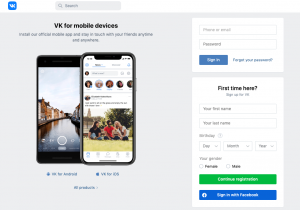AltSocial
The primary use for social media is for users to stay connected. We’re usually surrounded by the big LIFT (LinkedIn, Instagram, Facebook and Twitter) in India. However, there is an entire subterranean layer of alternate social networks that have popped up for specific audiences. This series aims to shed light on 4 of these AltSocial platforms.
VK (or VKontakte)
From Russia, with love.
When I write, I usually listen to a genre of music called Progressive Trance. It calms me. Allows me to focus.
One of my favourite dutch producers and DJ, Armin Van Buuren has been playing his weekly radio show – A State Of Trance, for over 15 years with the best in trance from across the world. With the advent of more publishing platforms, his show is now live streamed across multiple platforms including his dedicated radio channel, many syndicated shows by existing radio networks and digital platforms like his website, Spotify, YouTube and Facebook.
Whilst introducing fan favourite tracks across the two hours he plays, he often mentions that they’re live on the aforementioned platforms and VK.
VK? Never heard of it.
Good. Otherwise he-who-shall-not-be-named might know who you are.
The thing is, like China, Russia has their own way of adopting social networks. Unlike China though, Runet, (a portmanteau of the Russian Internet) is not entirely under the scanner of the government.
Well, not yet. (at the time of this writing)
Who founded it?
VK was founded by the richest man you’ve never heard of. Pavel Durov, is often called Russia’s Mark Zuckerberg. After reading up on him, it’s clear that the man is worth every dollar of his $17.2 Billion net worth.
By the way, with his elder brother Nikolai, he also founded Telegram.
Seriously.
So, what is VK then?

What seems like an alternate reality of the Facebook story, a 22 year old Pavel started the company in 2007 after graduating college from St Petersburg State University. The social network quickly grew within university circles (initially only through invitation) to 100,000 users in 7 months.
In December 2008, VK became Russia’s most popular social media platform overtaking it’s prime competition ok.ru
Today, with a monthly 1.5 billion visits, it is the 2nd most visited website in Russia and 15th most visited website in the world.
What is it like?
Originally, it was a wasteland. Piracy was rampant.
“Everything was accessible for free and through a single resource: music, films, pornography. These things couldn’t be found on Facebook” says Maxim Kornev, the Faculty of Television, Radio and Internet Technologies at the Russian State University for the Humanities
 Over time, as the company grew, VK became more respectable. VK is (mostly) like Facebook in the social networking aspects:
Over time, as the company grew, VK became more respectable. VK is (mostly) like Facebook in the social networking aspects:
- Messaging – Direct messages and public posts
- News feed – Hashtags, picture and videos are supported
- Communities – Closed groups, pages and events
- Engagement buttons – Likes, Shares, comments
But VK has some unique features up it’s sleeves:
- Music streaming – Personal and paid/ad-supported platform (FB is working on this with Spotify)
- SMS integration: Users can use their phone’s SMS to send and update their feed
- File sharing: Like WhatsApp, VK allows you to send most formats of files to individuals and in communities.
- Dating: Justin of HackPack, tells Inverse that VK is also used a lot for meeting new people to ask them out or even date casually or long-term. (Also something Facebook is trying, but failing at… See a trend here?)
Why do I do need to care?
I asked myself the same thing. I came up with three reasons:
- They defeated Facebook: Facebook is scampering to create the kind of appeal VK has in Russia, Belarus, Ukraine and nearby Eurasian nations. FB also seems to get “heavily inspired” by their features.
Want a prediction? Facebook might launch a P2P file sharing feature very soon.
- Intense influence in Russia: If marketing in the Eurasian countries is your motive, VK is the place to go. According to Statista, VK has over 70 million users in Russia. That’s about half the population of the entire country.
- They have their own money: In 2019, they launched VKCoin, a cryptocurrency (can’t escape this word these days, can you?). At the time of writing this, however, the coin has reduced in it’s value to about $0.00014.
Uh. Okay. Get to the spicy part now! What does the big man say about it?
He doesn’t say much. He controls it now.
In early 2014, Pavel sold of his remaining stake to Russian business magnate Alisher Usmanov and some other investors who are, uh, ‘close friends’ with the man who’s name sounds like a Canadian dish consisting of french fries and cheese. Equity changed hands a couple more times and continues to remain under the watchful eyes of ‘the man’.
To be fair, under new management, the website has done really well and has grown considerably.
VK is now under the Mail.Ru group, Russia’s largest internet company. They also own Ok.Ru (VK’s closest competitor) and ICQ, one of Russia’s largest messaging platforms.
Pavel, on the other hand left the country and now works with his brother Nikolai on Telegram and has invested in some new blockchain ventures.
It’s a new world
If it wasn’t clear yet, this essay’s purpose is not to coax you to join in or hate on VK. It’s attempt is to make you think:
- About the process of a tech company’s formation, growth and transformation in post-soviet Russia.
- Tell you what they did well and the journey of the founder.
- Make you believe that innovation can come from anywhere.
I’d like to leave you with this Interview between Pavel and TechCrunch. Gave me something to think about:
Stay curious.
Stay secure.
See you next week.
The views and opinions published here belong to the author and do not necessarily reflect the views and opinions of the publisher.



Be the first to comment on "AltSocial: Part 2 – VKontakte"